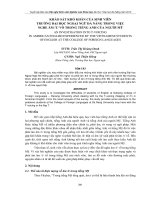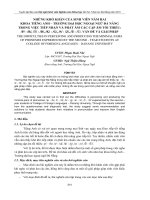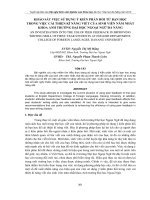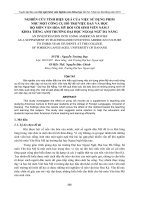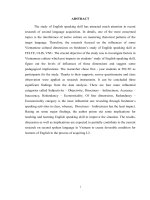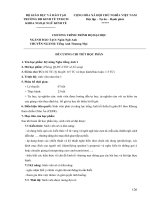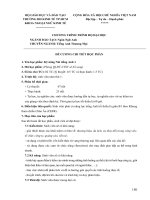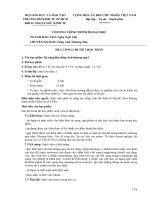ĐỀ THI MÔN PHIÊN DỊCH 3 TIẾNG ANH THƯƠNG MẠI TRƯỜNG ĐẠI HỌC NGOẠI NGỮ ĐÀ NẴNG
Bạn đang xem bản rút gọn của tài liệu. Xem và tải ngay bản đầy đủ của tài liệu tại đây (117.4 KB, 24 trang )
ENGLISH INTERPRETING TEST
GRADUATION
TIME LIMIT: 3-5 MINUTES / CANDIDATE
(HANDOUTS FOR EXAMINERS)
TRANSCRIPT ENGLISH - VIETNAMESE
1. King Bhumibol came to power 70 years ago. He was the world’s
longest serving monarch.
He was born in 1927 in the American community of Cambridge,
Massachusetts, where his father was studying medicine. The future
king was educated mostly in Europe, attending secondary school
and a university in Switzerland.
2. He studied music, and was a skilled saxophone player
and composer of jazz. He also liked sailing and wrote several
books, including a best-seller about his favorite dog.
He became Thailand’s king in 1946 after the mysterious shooting
death of his older brother.
3. The United Nations Food and Agriculture Organization says
Africa has more food security problems than any other continent.
Representatives of more than 50 countries gathered in Tunisia
capital Tunis last month for the agency's 28th yearly Conference
on Africa.
4. The meeting ended with a renewed promise of support for food
security and continuing development. The FAO says Africa has
had strong economic growth in recent years. But it says the
continent continues to suffer from low agricultural productivity,
low incomes in rural areas and high rates of malnutrition.
5. The United Nations says more than one-thousand-million people
in the world do not have safe, clean water to drink. This is about
one-sixth of the world's population. More than two-thousandmillion people do not have effective sanitation systems to remove
bodily wastes. The U-N estimates that six-thousand people died
each day from preventable diseases caused by unclean water or
poor sanitation. Most of them are children.
6. China and Taiwan may disagree on political issues. But on
Thursday they reached an agreement to protect investors. The
agreement is important because China and Taiwan do not have
diplomatic relations. China claims Taiwan as its territory. But
Taiwan has been self-governing since nineteen forty-nine.
7. The sides agreed to open new industries to investment and to
inform the other within twenty-four hours if an investor is arrested.
Talks on the deal have lasted two years. But they have been slowed
because of the different legal systems in the two areas.
8. Samsung says it has permanently halted production of its Galaxy
Note 7 smart phone after continued overheating problems.
The company announced Tuesday it had stopped manufacturing
and selling the troubled devices. Samsung said it was acting to
protect the safety of phone users.
9. The company issued a worldwide recall of Galaxy Note 7
devices in early September after receiving several reports of
overheating problems. The overheating was linked to problems
with batteries that caused some phones to catch fire.
10. After the recall, Samsung began replacing customers’ phones
with new Note 7 devices that had a different battery. Those devices
were supposed to be safer. But there were numerous reports of
those replacement phones also overheating.
11. South Korean safety authorities are investigating the problems
with the replacement devices. They have not yet identified a cause.
The company is offering to give buyers their money back or
exchange the Note 7 phones for other Samsung models.
12. Samsung is the world’s largest maker of smart phones, with
nearly twice the world market share of its main competitor Apple.
Jonathan Roubini is an independent technology analyst. He says in
addition to the actual smart phone problems, the company has also
been criticized for the way it dealt with the first phone recall.
1. Samsung says it has permanently halted production of its Galaxy Note 7
smart phone after continued overheating problems.
The company announced Tuesday it had stopped manufacturing and selling
the troubled devices. Samsung said it was acting to protect the safety of
phone users.
2. The company issued a worldwide recall of Galaxy Note 7 devices in early
September after receiving several reports of overheating problems. The
overheating was linked to problems with batteries that caused some phones
to catch fire.
3. After the recall, Samsung began replacing customers’ phones with new
Note 7 devices that had a different battery. Those devices were supposed to
be safer. But there were numerous reports of those replacement phones also
overheating.
4. South Korean safety authorities are investigating the problems with the
replacement devices. They have not yet identified a cause.
The company is offering to give buyers their money back or exchange the
Note 7 phones for other Samsung models.
5. The Federal Aviation Administration issued a warning to airplane
passengers last month about the Galaxy Note 7 phones. It told passengers
not to use devices during flights. It also urged them not to put the phones in
checked baggage.
6. Samsung is the world’s largest maker of smart phones, with nearly twice
the world market share of its main competitor Apple.
Jonathan Roubini is an independent technology analyst. He says in addition
to the actual smart phone problems, the company has also been criticized for
the way it dealt with the first phone recall.
1. China and Taiwan may disagree on political issues. But on Thursday they
reached an agreement to protect investors. The agreement is important
because China and Taiwan do not have diplomatic relations. China claims
Taiwan as its territory. But Taiwan has been self-governing since nineteen
forty-nine.
The sides agreed to open new industries to investment and to inform the
other within twenty-four hours if an investor is arrested. Talks on the deal
have lasted two years. But they have been slowed because of the different
legal systems in the two areas.
2. In May, anti-China protesters in Vietnam caused damage to at least 460
factories owned by foreigners. Thousands of foreign investors fled Vietnam.
They fear there would be more riots. But foreign investment has now
returned to level standard existed before the protests.
The flow of money returned for three main reasons. The government has
promised to protect for investors, also the economy continues to grow.
Finally, the cost of manufacturing remains low. Clothing, furniture and
electronics factories have began operating again in Vietnam. 20 people dead
in protests and hundreds were injured. The protesters were angry about
China's placement of an oil industry structure in waters that Vietnam claims
as its territory.
3. Long-term tensions between the two countries worsened. China and
Vietnam fought a border war in 1979. Foreign investment is 17 percent of
Vietnam's economy and 66 percent of its exports. It provides half of
Vietnam's tax income. Ralf Matthaes is the owner of a market advising
company in Ho Chi Minh city. He says foreign investment has returned
because of the government's strong actions. Foreign investors from Japan,
Singapore, South Korea and Taiwan have entered Vietnam since the
government ended investment restrictions in 1987. Their projects have
helped support Vietnam's $155 billion economy and have lowered poverty
by adding jobs.
4. In July, China moved the platform following talks with Vietnam. Before
the riots China was the seventh largest investor in Vietnam. Last year, it
invested $2.3 billion in the country, that was six times more than in 2012.
Much of that investment was materials use to make clothing, machines and
other goods.
In the future, Vietnam is expected to make it easier for foreign investors to
do business in the country. It will increase the rights of foreign investors to
use land. And it will build new transportation systems linking Ho Chi Minh
City to manufacturing areas.
5. From time to time we examine different organizations involved in
development and relief work around the world. This week we tell about
Oxfam. Oxfam is an independent British organization. The group works in
poor communities with local organizations. It says it tries to find permanent
answers to poverty and suffering. It says every human being has the right to
self-respect and a chance to succeed.
6. After World War Two, Oxfam decided to continue on and extend its aid to
more than just war victims. It saw a need for humanitarian relief in all parts
of the world.
Today, Oxfam has programs in more than seventy developing countries. It
says that in each case, it employs local people who know the issues affecting
their communities. Oxfam also carries out education campaigns and policy
work. It says it wants to make sure governments and international
organizations understand the problems that face the world's poor.
7. Oxfam depends on money from supporters to operate. A committee
governs the organization with the help of a lower-level group. The members
of the two committees are not paid. A chief executive supervises the daily
operations of Oxfam.
Over the past fifty years, Oxfam has carried out numerous projects. It has
helped communities to set up schools. The organization will pay for building
classrooms and for equipment and teacher-training programs. Oxfam has
helped communities improve their health services and water supplies. And it
trains local people to teach others in their villages about cleanliness and
healthy foods.
8. Hilton Worldwide is selling the Waldorf Astoria hotel in New York City to
a Chinese company for $1.95 billion. The buyer -- Anbang Insurance Group
-- will pay one of highest prices ever for a U.S. hotel. Hilton Worldwide says
it will use the money from the sale to buy other hotels in the United States.
As part of the deal, Hilton will continue to operate the Waldorf Astoria for
the next 100 years.
The Chinese buyer has said it will invest in remodeling the famous property
on Park Avenue to bring it back to its "historical grandeur."
9. Reports say the deal is the largest for a Chinese company buying a U.S.
building. Chinese investors increasingly have become interested in U.S.
properties. Homes -- especially costly ones -- are considered a good
investment. The National Association of Realtors says China's spending on
homes in the U.S. has increased sharply. The trade group estimates that
Chinese buyers spent $22 billion on real estate properties in the twelvemonth period ending in March 2014. That is an increase of 72 percent over
the 12-month period before.
10. Chinese companies also increasingly are seeking businesses outside of
the energy and raw materials industries. Last year, a Chinese company
bought Smithfield Foods, the largest pork producer in the U.S., for nearly $5
billion.
China holds about $1.2 trillion dollars in United States treasury securities.
While these investments are safe, they do not give high returns, or yields.
China has increasingly looked for other ways to invest its huge trade surplus
with the U.S.
11. For many years, Japan has had a large trade surplus with the U.S. In the
1980s, Japanese companies bought important U.S. properties. These
included a controlling share of Rockefeller Center, also in New York, in
1989. However, not all of these investments made a profit.
The Waldorf Astoria hotel opened in 1931. It has been a symbol of the
wealth and culture of New York City since that time. World leaders and
other very famous people have stayed at the hotel. Recently, many delegates
to the United Nations General Assembly stayed at the hotel.
12. The Chinese and Indian foreign ministers have discussed ways to ease
tensions and increase economic ties. It was the first high level meeting
between the Asian powers since a new government took power in India.
Chinese Foreign Minister Wang Yi and his Indian counterpart, Sushma
Swaraj, met for three hours in the Indian capital New Delhi.
Afterwards, Indian official said both countries agreed much could be done to
improve their economic relationship. Gautam Bambawale of India's foreign
ministry says China will consider the possibility of expanding economic
cooperation between the two countries.
13. Indian Officials say more Chinese investment could reduce India's trade
deficit with China. That deficit has increased to more than $30 billion. India
says it wants more Chinese investment in roads, ports and other systems.
India also would like increased investment in manufacturing - areas in which
India is behind China.
Some foreign policy observers in India expect new Prime Minister Narendra
Modi to increase economic ties with China as he tries to meet his campaign
promise to develop India's economy. But the two countries also have a
disputed boarder in the Himalayas. The conflict remains unsettled after years
of negotiations. India accuses Chinese troops of entering its territory in the
past year raising tensions.
The Chinese Premier Li Keqiang was the first foreign leader to congratulate
Prime Minister Narendra Modi in his election victory. Mr. Modi described
China as "always a priority in India's foreign policy."
14. The longest railway in the world is now open. In December, a train carrying
products from China arrived in Spain's capital, Madrid. The railway is one of the
most recent transportation projects that China has financed in Europe. China is
paying to improve roads, bridges and railroads to increase trade between East Asia
and Europe. The European Union is China's biggest trading partner, and Europe is
welcoming the money China is spending to improve infrastructure.
The train carried 40 containers and travelled 13,000 kilometers. It began in Yiwu, a
Chinese city in the coastal province of Zhejiang, in November. It arrived in Madrid three
weeks later. A ship would take about six weeks to make the same trip.
The train is to return to China with Spanish wine and food before the beginning of the
Chinese New Year in February.
15. Large numbers of opium poppy plants grow in the mountains of
Myanmar’s Shan State. In fact, Shan State is the second-largest opiumproducing area in the world.
After a drop in production during the 2000s, the number of poppies has risen
in the past eight years. Some experts have linked the increased production to
a growing demand for the drug heroin in China. But Myanmar’s poppy
farmers are now earning less on their crops.
Now, the United Nations is hoping many will decide to grow coffee instead.
16. For years, thousands of Shan State farmers have earned more profit from
sales of opium poppy than from other crops. But poppy prices fluctuate;
they may rise one month, but fall the next.
Fifty-four-year-old Long San is a poppy farmer. He was one of 400 growers
who last year joined a U.N.-supported crop replacement program. Long San
is now growing coffee.
So far, Myanmar’s efforts to cut down on poppy growing have done little to
stop the farmers. A U.N. study found that more than 57-thousand hectares of
poppy were grown in Shan State last year. That is almost three times the area
farmed in 2006.
That has made Myanmar second only to Afghanistan in production.
17.
Samsung says it has permanently halted production of its Galaxy Note 7
smartphone after continued overheating problems.
The company announced Tuesday it had stopped manufacturing and selling
the troubled devices. Samsung said it was acting to protect the safety of
phone users.
The company issued a worldwide recall of Galaxy Note 7 devices in early
September after receiving several reports of overheating problems. The
overheating was linked to problems with batteries that caused some phones
to catch fire.
18. After the recall, Samsung began replacing customers’ phones with new
Note 7 devices that had a different battery. Those devices were supposed to
be safer. But there were numerous reports of those replacement phones also
overheating.
South Korean safety authorities are investigating the problems with the
replacement devices. They have not yet identified a cause.
The company is offering to give buyers their money back or exchange the
Note 7 phones for other Samsung models.
19. The Federal Aviation Administration issued a warning to airplane
passengers last month about the Galaxy Note 7 phones. It told passengers
not to use devices during flights. It also urged them not to put the phones in
checked baggage.
Samsung is the world’s largest maker of smartphones, with nearly twice the
world market share of its main competitor Apple.
Jonathan Roubini is an independent technology analyst. He says in addition
to the actual smartphone problems, the company has also been criticized for
the way it dealt with the first phone recall.
20.
Officials in Thailand are working to help the tourism industry in several
provinces affected by deadly bombings earlier this month.
Bombings in several southern provinces killed or wounded more than 30
people, including foreigners.
Experts say more attacks could have a deeper effect on the industry, which is
very important to the country’s economy.
Economists at the University of the Thai Chamber of Commerce say the
attacks may cause up to 365,000 fewer people to visit the provinces. And
they estimate the areas could lose $170 million in revenue.
21.
The fourth of July is Independence Day in the United States. On that day, we
celebrate the decision by early American leaders to declare independence
from Britain.
While people in both England and the U.S. speak English, the two types of
English can be very different.
First, there are differences in spelling. The British like the letter “u” and
have kept it in many words. Americans have dropped it. Somewhere in our
language history, we decided that “labor,” “color” and “favorite” were just
fine without the “u” next to the “o.”
But our differences go beyond spelling. Sometimes, we use different words
entirely.
Here, we live in apartments with elevators. Over there, they live
in flats with lifts.
We put diapers on our babies and push them in strollers. The British love
their babies just as much as we do, but they use nappies and prams instead.
We power our cars with gas. They use petrol.
And, if we need to look in our car’s dark trunk for something, we use
a flashlight. They would use a torch to search their dark boot.
22. China has established a clearing center for its money in the United
States.
The Bank of China’s office in New York City is the first U.S. clearing center
for the renminbi, or RMB.
Chinese officials made the announcement last week. Premier Li Keqiang
spoke at a dinner with the Economic Club of New York. He invited other
banks to work with buyers and sellers of the RMB.
“We also welcome banks in New York that meet the requirements to
become a clearing bank for renminbi,” Li said. The South China Morning
Post reported his comments.
Some people see China’s move as an attempt to show that the RMB, also
known as the yuan, is competitive with the U.S. dollar as a major currency.
They say there is no reason for China to have U.S. banks serving as clearing
centers for its money.
23.
Currently, there are clearing banks in a number of financial centers,
including Hong Kong, London, Singapore and Toronto.
On October 1, the RMB is to become the fifth currency in the International
Monetary Fund’s group of Special Drawing Rights. The four others are the
U.S. dollar, the British pound, the Japanese yen and the euro.
Christopher Balding teaches at Peking University. He says China is buying
up available RMB on international markets in an effort to increase its value.
He told VOA that the value of Chinese money would drop sharply if it were
freely traded.
China’s recent policy has been to keep the money stable -- to avoid sharp
increases or decreases in value against other currencies. The exchange rate is
currently between six and seven RMB to the dollar.
For many years, China has sought to make its money one of the important
currencies of international trade.
24. China is using travel as an important tool to help strengthen its economy.
China also hopes to increase its influence on world events by sending more
travelers overseas.
This hope was evident at the recent First World Conference on Tourism.
There, a Chinese official spoke about the government's plan for using
tourists and the money they spend.
The head of China’s National Tourism Administration, Li Jinzao, said the
country is expecting some big numbers from tourism.
Li told the conference that China plans to send 150-million travelers along
what he called the “One Belt, One Road." In the next five years, these
tourists are expected to spend $200 billion, he said. This spending estimate
is likely to raise expectations among countries along the ancient Silk Road,
which links China to its neighbors.
25. China has reasons to feel it can use tourism to influence foreign policy.
Governments across the world are changing their immigration rules to
welcome the growing numbers of Chinese tourists. Japan recently
announced it would offer 10-year visas to Chinese businessmen and artists.
The desire to attract tourists has led Nepal and Sri Lanka to change their
relationships with China, too.
Chinese citizens are now going to places where in the past Chinese rarely
went. Their decisions are often based on political sensitivities or the desire
to buy luxury goods.
26. A new study finds that more than 80 percent of people living in cities are
breathing unsafe air.
The World Health Organization study on urban air quality says those most
affected live in the world's poorest cities. The study finds urban air pollution
has nearly doubled in 3,000 cities over the past two years. The cities are in
103 countries.
The study also shows that almost all cities with populations over 100,000,
and in developing countries, have air pollution levels that do not meet WHO
guidelines.
The WHO warns that as air quality worsens the risk increases for many
diseases. These include stroke, heart disease, lung cancer, and breathing
diseases such as asthma. Poor air quality is also responsible for an estimated
seven million premature deaths every year.
27. People in the United States who enjoy smoking Cuban cigars celebrated
Friday.
The U.S. government ended its restriction on cigars, a tobacco product made
in Cuba. The U.S. did the same for the alcohol called rum.
Both are two well-known products from Cuba. They had been banned in the
U.S. for almost 50 years. American travelers who purchased Cuban-made
products were not permitted to bring them into the U.S.
That changed in 2014, when the government agreed to let travelers return
home with cigars and rum valued at $100 or less.
But now even that restriction is over. The U.S. government announced the
news on Friday along with other plans for boosting trade with Cuba.
However, the sale of Cuban cigars and rum in the U.S. remains illegal.
28. Thailand is mourning King Bhumibol Adulyadej.
To declare a national mourning day
King Bhumibol died Thursday in Bangkok. He was 88 years old.
In recent years, the king suffered from a series of age-related health
problems that mostly kept him in a Bangkok hospital.
Last weekend, Thai officials announced that his health had worsened and his
condition was “not stable.”
Officials said on Thursday his health never improved and that he died
peacefully.
29. King Bhumibol came to power 70 years ago. He was the world’s longest
serving monarch.
He was born in 1927 in the American community of Cambridge,
Massachusetts, where his father was studying medicine. The future king was
educated mostly in Europe, attending secondary school and a university in
Switzerland.
He studied music, and was a skilled saxophone player and composer of jazz.
He also liked sailing and wrote several books, including a best-seller about
his favorite dog.
He became Thailand’s king in 1946 after the mysterious shooting death of
his older brother.
30. The United Nations Food and Agriculture Organization says Africa has
more food security problems than any other continent. Representatives of
more than 50 countries gathered in Tunisia capital Tunis last month for the
agency's 28th yearly Conference on Africa.
The meeting ended with a renewed promise of support for food security and
continuing development. The FAO says Africa has had strong economic
growth in recent years. But it says the continent continues to suffer from low
agricultural productivity, low incomes in rural areas and high rates of
malnutrition.
VIETNAMESE – ENGLISH TASK
1. Trung Quốc vừa khai trương tuyến đường sắt dài nhất thế giới. Những
chuyến tàu sẽ mang hàng hóa từ Trung Quốc đến Tây Ban Nha. Đây là một
trong những dự án vận tải quan trọng nhất mà Trung Quốc đã đầu tư vào
Châu Âu. Trung Quốc cũng đã tài trợ để nâng cấp đường sá, cầu và đường
tàu hỏa ở Tây Ban Nha và một số nước Châu Âu nhằm gia tăng mậu dịch
giữa Đông Á và Châu Âu.
2. Đại học Quốc gia thành phố Hồ Chí Minh có chương trình trao đổi sinh
viên ngắn hạn tại Truờng Đại học Hokhaido Nhật bản năm học 2013- 2014.
Theo đó, sinh viên được lựa chọn sẽ tham gia đợt trao đổi 1 năm học (11
tháng). Trong năm này, sinh viên sẽ tham gia các lớp học bằng tiếng Anh về
các lĩnh vực văn hóa, xã hội, môi trường, khoa học và công nghệ. Sinh viên
được nhận khoản trợ cấp dành cho lưu học sinh 80.000 yen mỗi tháng, tương
đương với 1.000 USD.
3. Chiều 14-12, Thủ tướng Nguyễn Tấn Dũng đã cắt băng khai trương
đường bay thẳng Hà Nội – Phú Quốc của Tổng Công ty Hàng không Việt
Nam. Đường bay thẳng Hà Nội – Phú Quốc sẽ chính thức đi vào hoạt động.
Với tần suất 5 chuyến/tuần, bằng máy bay Airbus 321. Đường bay thẳng sẽ
góp phần quan trọng vào việc thúc đẩy phát triển kinh tế, thương mại đầu tư
và du lịch của huyện đảo Phú Quốc, tỉnh Kiên Giang.
4. Gấu trúc cao tuổi nhất thế giới qua đời
Sau sinh nhật lần thứ 38, gấu trúc nuôi nhốt già nhất thế giới qua đời hôm
16/10 vừa qua tại công viên quốc gia Ocean Park, Hong Kong, Trung Quốc.
Trung Quốc thúc đẩy quan hệ ngoại giao thông qua việc tặng hoặc cho mượn
các cá thể gấu trúc lớn cho các quốc gia trên thế giới. Chính sách này thực tế
đã tồn tại từ lâu trong lịch sử Trung Quốc.
5. Bill Gates không hối hận vì bỏ học Harvard
Ông cho biết mình vẫn luôn đọc sách và học hỏi từ bên ngoài để bù lại
những gì đã bỏ lỡ khi rời trường giữa chừng.
Câu chuyện thành công của Bill Gates đã trở thành huyền thoại. Dù có điểm
số cao, năm 1975, ông vẫn bỏ ngang Đại học Harvard để đồng sáng lập
Microsoft, mở đầu cho chặng đường trở thành người giàu nhất thế giới.
6. Trong 20 năm qua, chính phủ Australia đã có những chương trình viện trợ
nhân đạo và viện trợ phát triển cho Việt Nam. Mỗi năm, chính phủ Australia
đã câp 500 học bỗng cho các học sinh, giáo viên và cán bộ có thành tích xuất
sắc trong công tác và học tập đi đào tạo Thạc sỹ và Tiến sỹ ở Australia.
Ngoài ra, các dự án về môi trường và nước sạch cũng đi vào hoạt động có
hiệu quả, góp phần cải thiện môi trường và điều kiện sống cho người dân ở
các tỉnh đồng bằng sông Cửu Long và các tỉnh vùng cao như Gia Lai,
Kontum và Dalak.
1.
Thủ tướng Nguyễn Tấn Dũng sẽ đến thăm Australia nhân kỷ niệm 35 năm
ngày thiết lập quan hệ ngoại giao Việt Nam – Australia. Thủ tướng sẽ đến
thủ đô Canberra. Tại đây, Thủ tướng sẽ gặp gỡ và làm việc với Thủ tướng
Australia, sau đó Thủ tướng sẽ đến làm việc với Chủ tịch Thượng viện và Hạ
viện Australia tại thành phố Melbourne. Theo kế hoạch, Thủ tướng cũng sẽ
tham dự Diễn đàn Doanh nghiệp Việt Nam – Australia.
2. Trong 20 năm qua, chính phủ Australia đã có những chương trình viện trợ
nhân đạo và viện trợ phát triển cho Việt Nam. Mỗi năm, chính phủ Australia
đã câp 500 học bỗng cho các học sinh, giáo viên và cán bộ có thành tích xuất
sắc trong công tác và học tập đi đào tạo Thạc sỹ và Tiến sỹ ở Australia.
Ngoài ra, các dự án về môi trường và nước sạch cũng đi vào hoạt động có
hiệu quả, góp phần cải thiện môi trường và điều kiện sống cho người dân ở
các tỉnh đồng bằng sông Cửu Long và các tỉnh vùng cao như Gia Lai,
Kontum và Dalak.
3. Một báo cáo do tổ chức Lao động Quốc tế của Liên hiệp quốc (ILO) cho
biết con số trẻ em tham gia vào các hoạt động kinh tế có giảm đi nhiều. Tuy
nhiên, vẫn còn hơn 165 triệu trẻ em ở độ tuổi từ 5 đến 14 tham gia vào lực
lượng lao động. Những trẻ em này bỏ học sớm và chấp nhận mọi việc thậm
chí trong môi trường làm việc nguy hiểm. Nhiều em bé gái bị cưỡng bức (to
be forced into) vào con đường mãi dâm hoặc trở thành nạn nhân của nạn
buôn người.
4. Con số du khách Nhật Bản đến Việt Nam cứ tăng dần từ đầu thập niên
2000. Từ tháng 1/2004, Việt Nam đã chính thức đơn phương miễn thị thực
cho người Nhật Bản đi du lịch và kinh doanh vào Việt Nam trong vòng 15
ngày và gần đây nhất từ 1/7/2004, Việt Nam đã quyết định miễn thị thực
nhập cảnh ngắn hạn cho công dân Nhật. Đây là thuận lợi lớn để thúc đẩy du
lịch Nhật Bản vào Việt Nam.
5. Trong nhiều thập kỷ qua, Mỹ luôn đi đầu thế giới như một điểm đến cho
sinh viên quốc tế . Năm ngoái, các trường đại học Mỹ đã tiếp nhận hơn
900.000 sinh viên quốc tế. Hơn một nửa con số này đến từ Châu Á. Tuy
nhiên, gần đây nhiều sinh viên Châu Á đang hướng đến một quốc gia nói
Tiếng Anh gần với đất nước họ hơn và chi phí rẻ hơn, đó là Philipin.
6. Trung Quốc vừa khai trương tuyến đường sắt dài nhất thế giới. Những
chuyến tàu sẽ mang hàng hóa từ Trung Quốc đến Tây Ban Nha. Đây là một
trong những dự án vận tải quan trọng nhất mà Trung Quốc đã đầu tư vào
Châu Âu. Trung Quốc cũng đã tài trợ để nâng cấp đường sá, cầu và đường
tàu hỏa ở Tây Ban Nha và một số nước Châu Âu nhằm gia tăng mậu dịch
giữa Đông Á và Châu Âu.
7. Đại học Quốc gia thành phố Hồ Chí Minh có chương trình trao đổi sinh
viên ngắn hạn tại Truờng Đại học Hokhaido Nhật bản năm học 2013- 2014.
Theo đó, sinh viên được lựa chọn sẽ tham gia đợt trao đổi 1 năm học (11
tháng). Trong năm này, sinh viên sẽ tham gia các lớp học bằng tiếng Anh về
các lĩnh vực văn hóa, xã hội, môi trường, khoa học và công nghệ. Sinh viên
được nhận khoản trợ cấp dành cho lưu học sinh 80.000 yen mỗi tháng, tương
đương với 1.000 USD.
8. Chiều 14-12, Thủ tướng Nguyễn Tấn Dũng đã cắt băng khai trương
đường bay thẳng Hà Nội – Phú Quốc của Tổng Công ty Hàng không Việt
Nam. Đường bay thẳng Hà Nội – Phú Quốc sẽ chính thức đi vào hoạt động.
Với tần suất 5 chuyến/tuần, bằng máy bay Airbus 321. Đường bay thẳng sẽ
góp phần quan trọng vào việc thúc đẩy phát triển kinh tế, thương mại đầu tư
và du lịch của huyện đảo Phú Quốc, tỉnh Kiên Giang.
9. Gấu trúc cao tuổi nhất thế giới qua đời
Sau sinh nhật lần thứ 38, gấu trúc nuôi nhốt già nhất thế giới qua đời hôm
16/10 vừa qua tại công viên quốc gia Ocean Park, Hong Kong, Trung Quốc.
Trung Quốc thúc đẩy quan hệ ngoại giao thông qua việc tặng hoặc cho mượn
các cá thể gấu trúc lớn cho các quốc gia trên thế giới. Chính sách này thực tế
đã tồn tại từ lâu trong lịch sử Trung Quốc.
10. Bill Gates không hối hận vì bỏ học Harvard
Ông cho biết mình vẫn luôn đọc sách và học hỏi từ bên ngoài để bù lại
những gì đã bỏ lỡ khi rời trường giữa chừng.
Câu chuyện thành công của Bill Gates đã trở thành huyền thoại. Dù có điểm
số cao, năm 1975, ông vẫn bỏ ngang Đại học Harvard để đồng sáng lập
Microsoft, mở đầu cho chặng đường trở thành người giàu nhất thế giới.
